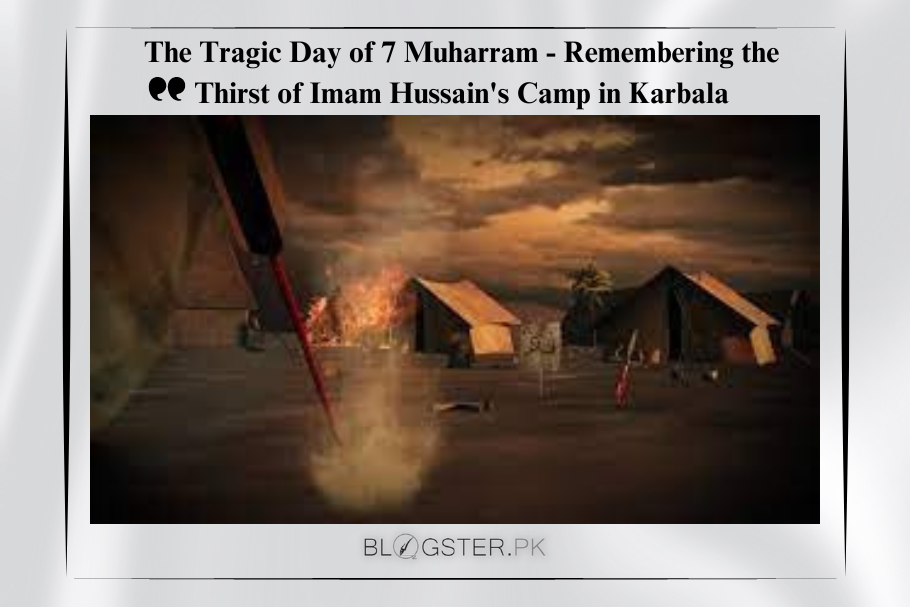The Tragic Day of 7 Muharram – Remembering the Thirst of Imam Hussain’s Camp in Karbala

The Tragic Day of 7 Muharram - Remembering the Thirst of Imam Hussain's Camp in Karbala
Introduction
The event of Karbala holds immense significance in Islamic history, serving as a poignant reminder of sacrifice, faith, and perseverance. One of the most tragic days during this event is 7 Muharram, when water was cruelly denied to Imam Hussain’s camp.
As the sun mercilessly scorched the land, the children in the camp grew increasingly thirsty, marking a heart-wrenching chapter in the annals of human suffering. Today, we remember this somber day to honor the courage of Imam Hussain and his companions and reflect on the timeless lessons of compassion and resilience.
The Background of Karbala
The incident of Karbala took place in the year 680 CE (61 AH) in present-day Iraq. It was a clash between the forces of Yazid, the Umayyad caliph, and Imam Hussain ibn Ali, the grandson of Prophet Muhammad (peace be upon him).
Imam Hussain stood for justice, refusing to pledge allegiance to the oppressive and tyrannical rule of Yazid. His unwavering stance for truth and principles earned him the respect and admiration of many, but it also resulted in a small group of loyal followers, including his family members, facing the mighty forces of Yazid in the desolate plains of Karbala.
7 Muharram: The Tragedy of Denied Water
As the confrontation intensified, Yazid’s army surrounded Imam Hussain’s camp in Karbala and imposed a siege to cut off their access to water from the nearby Euphrates River. The cruelty of withholding water was a deliberate tactic to weaken the resolve of Imam Hussain’s followers and instill fear and uncertainty among them.
The scorching sun of the desert bore down on the small camp, and as the days passed, the situation grew dire. The thirst became unbearable, and even the youngest members of the camp, the innocent children, suffered from the pangs of dehydration. The elders, including Imam Hussain, sacrificed their own share of water, ensuring that the little water available was given to the children to ease their suffering.
Amidst the stifling heat and heart-rending cries of the children, the determination of Imam Hussain and his companions did not waver. Their unwavering faith and steadfastness in the face of adversity are emblematic of the timeless values of justice, resilience, and sacrifice.
The Lessons of Karbala
The tragedy of Karbala carries profound lessons for humanity. It teaches us the importance of standing up against oppression and injustice, even in the face of overwhelming odds. Imam Hussain’s refusal to submit to tyranny is a testament to the preservation of one’s principles and beliefs, regardless of the consequences.
Moreover, the episode of the thirsty children in Karbala reminds us of the value of compassion and empathy. In the midst of their own suffering, Imam Hussain and his companions prioritized the needs of the innocent children, showing us the essence of selflessness and love for humanity.
The commemoration of 7 Muharram is not just a ritual of mourning; it is a call for introspection and action. It urges us to stand against injustice, to support the oppressed, and to uphold the values of compassion and mercy in our lives.
Conclusion
The tragic day of 7 Muharram in the event of Karbala stands as a somber reminder of the sacrifices made for truth and justice. The denial of water to Imam Hussain’s camp, particularly the thirst endured by the innocent children, is a testament to the resilience and strength of the human spirit in the face of adversity.
Today, as we remember this heart-wrenching chapter of history, let us draw inspiration from the unwavering courage of Imam Hussain and his companions. Let us strive to be voices of justice and agents of compassion, keeping the spirit of Karbala alive in our hearts and actions.
For More Related Articles Browse Our Website Blogster.pk
For social Connection You can also Visit and follow our Social media Platforms
Facebook , Instagram, Linkedin, Pinterest, Quora, Twitter, Youtube.





